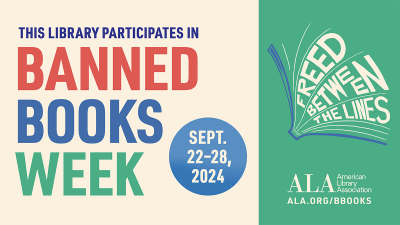
We’re celebrating the freedom to read during Banned Books Week, September 22nd-28th!
The freedom to read is essential to our democracy, and reading is among our greatest freedoms. Libraries are for everyone, everywhere. Because libraries provide free access to a world of information, they bring opportunity to all people.
Banned Books Week spotlights current and historical attempts to censor books in libraries and schools through challenges and bans. A challenge is an attempt to remove or restrict materials, based upon the objections of a person or group. A banning is the removal of those materials.
Attempts to ban or restrict access to books across the United States in our libraries and schools have increased in recent years.
In 2023, American Library Association (ALA)’s Office for Intellectual Freedom documented 1,269 demands to censor library books and resources, the highest number of attempted book bans since ALA began compiling data about censorship in libraries more than 20 years ago. 4,240 unique book titles were targeted for censorship in 2023, a 65% increase compared to 2022 numbers.
“The reports from librarians and educators in the field make it clear that the organized campaigns to ban books aren’t over, and that we must all stand together to preserve our right to choose what we read,” says Deborah Caldwell-Stone, director of ALA’s Office for Intellectual Freedom. “Each demand to ban a book is a demand to deny each person’s constitutionally protected right to choose and read books that raise important issues and lift up the voices of those who are often silenced.”
In response to the surge of book challenges and efforts to restrict access to information, ALA recently launched Unite Against Book Bans, a national initiative to empower readers everywhere to stand together in the fight against censorship.
Censorship denies our freedom as individuals to choose and think for ourselves. For children, decisions about what books to read should be made by the people who know them best—their parents!
While books have been and continue to be banned in some places in the United States, part of the Banned Books Week celebration is the fact that, in a majority of cases, the books have remained available. This happens only thanks to the efforts of librarians, teachers, students, and community members who stand up and speak out for the freedom to read.
At the Pulaski County Public Library, we are committed to not restricting another’s right to obtain information.
As part of Banned Books Week, we are hosting a Community Banned Book Discussion on Thursday, Sept. 26th at 5:30. The book we’ll be discussing this year is Me and Earl and the Dying Girl by Jesse Andrews. All members of the community are welcome to attend this discussion. Free copies of the book are available at the library while supplies last!
Established in 1982, Banned Books Week brings together the entire book community in shared support of the freedom to read. By focusing on efforts to remove or restrict access to books, Banned Books Week draws national attention to the harms of censorship. Typically held during the last week of September, the annual event highlights the value of free and open access to information.
Celebrate the freedom to read at your library!